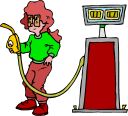Basic Economics: Scarcity and Choices
Part 1: Scarcity Think of a thing that you like to have. What would your life be like if you suddenly couldn't get any more of it?
People deal with this kind of problem every day. It's called scarcity. It comes from the word scarce, which means there isn't a lot of it or it isn't always available.
An older person in your family can probably tell you about a time 30 years ago when there was a gasoline shortage. At that time, in the 1970s, gasoline was scarce. Many people wanted to buy it, but only a certain amount was available. This is a great example of scarcity: Wants are more than what is available. The supply was low. Because the demand was greater than the supply, the gasoline was scarce. So how does scarcity relate to supply and demand? Scarcity is a measure of supply. If strawberries are scarce, then the supply of strawberries is low. And if many people want to buy strawberries when none are available, then demand is high because of a low supply caused by scarcity. Next page > Scarcity and Choices > Page 1, 2 |
|
Social Studies for Kids
copyright 2002–2024
David White



 What
does this mean for the demand of strawberries? If
enough people want strawberries when none are available,
then the demand is quite high. And the demand is high
not because the price is low (as is usually the case) but
because the supply is low.
What
does this mean for the demand of strawberries? If
enough people want strawberries when none are available,
then the demand is quite high. And the demand is high
not because the price is low (as is usually the case) but
because the supply is low.

